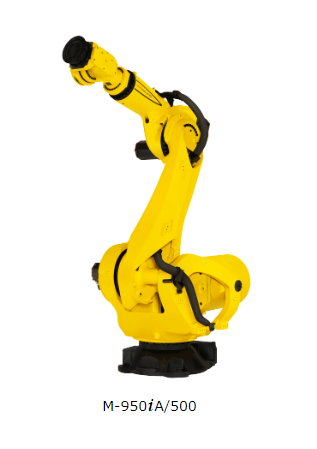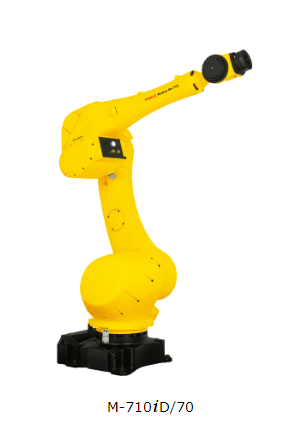ASIA ELECTRONICS INDUSTRYYOUR WINDOW TO SMART MANUFACTURING
New FANUC Robots Meet Various Automation Needs
FANUC Corporation has released two new robot models that expand automation options for the automotive, industrial, and manufacturing industries. Specifically, the new M-950iA/500 robot has a payload capacity of 500kg, while the M-710iD/70 has a payload capacity of 70kg.
M-950iA/500 Model
The M-950iA/500 expands FANUC’s extensive lineup of heavy-duty robots with payloads over 200kg, including the R-2000iC, M-900iB, M-1000iA, and M-2000iA.

Serial link mechanism
The M-950iA/500 is a serial-link robot offering a wider range of motion than standard parallel-link robots. It can extend its arm upright then rotate backward with minimal interference. This allows the building of flexible equipment by enabling the installation of high-payload robots in tight workspaces.
Adopting new motor and spring balancer
Two motors can drive one axis when the payload increases. In a single arm of a serial link, the second axis burdens the highest load. However, for the M-950iA/500, FANUC developed a new compact motor to drive the robot with a single motor. An optimized spring balancer allows the building of a simple structure for the robot. This achieves a well balanced mechanical unit with high reliability.
Strong wrist, high rigidity
The strong wrist and the higher payload make the new M-950iA/500 an ideal solution for automotive industry’s shift to giga-castings and EVs. The M-950iA/500 has the strongest allowable wrists moment and inertia in its payload class. This makes the robot suitable for transporting not only dimensionally large parts but also heavy parts like batteries.
In addition, the high rigidity of the robot contributes to high-quality automation in friction stir welding (FSW) and robot machining, for which demand has been increasing in recent years. Also, the robot’s absolute accuracy improvement function can be used for applications where trajectory is important.
Additionally, the M-950iA/500 can be powered by the FANUC R-30iB Plus Controller and the new R-50iA Controller. For installation on an existing line, the current controller can be selected, and for the new line, the selection of the new controller is possible along with the other robot models.
The new M-950iA/500 started mass production in January 2024.
M-710iD/70 Robot Model
Also, FANUC has introduced the M-710iD/70 robot, the second model to join the new M-710iD Series after the M-710iD/50M. The M-710iD series succeeds the M-710iC Series, which has been used by customers all over the world for 17 years since its introduction in 2006.

New model combining two previous models
The new M-710iD/70 robot has the operating speed of the M-710iC/50 and the load capacity of the M-710iC/70. By combining the key strengths of two previous robots, the new robot can help companies achieve their target cycle times and payload requirements with one model versus two. Thus, this consolidates the parts required for routine maintenance into one model. This makes it easier to manage and maintain the robot system.
Enhanced environmental resistance
Additionally, FANUC reduced the exposure of the robot’s joints, thus upgrading the splash and dust resistance performance to the next level. Also, the new robot is fully enclosed like the M-710iC. This enables use in very harsh environments like die casting removal and deburring.
Wide operating range and refined design
The robot’s curved J2 arm reduced interference with peripheral equipment at the front of the robot. Thus, transporting large workpieces close to the center of the robot becomes possible. This enabled a more compact robot system in a limited space. Improved rigidity while redesigning the mechanical unit smartly.
Utilizing these features, the use of M-710iD/70 is possible in a wide range of industrial fields. Among them are supplying parts to machine tools and transporting and assembling large workpieces.
Moreover, the M-710iD/70 can also be powered by the new R-50iA Controller in addition to the R-30iB Plus Controller. The robot can utilize the latest features of the new robot controller R-50iA and contribute to the automation in the manufacturing industry.
The new M-710iD/70 will start mass production in March 2024.




